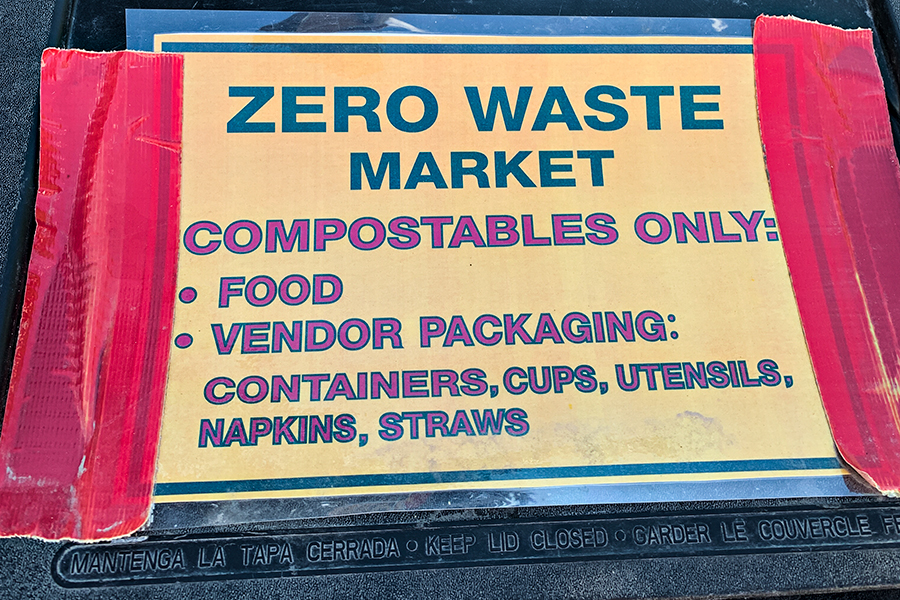In an effort to create an even more sustainable market this year, the Whitefish Farmers Market has partnered with local businesses and nonprofits to send “zero-waste” to the landfill.
Collaborating with Climate Smart Glacier Country (CSGC), a nonprofit focused on creating solutions for environmental issues, local vendors and Dirt Rich Compost, a local composting company, the farmers market used exclusively compostable containers with no trashcans to prevent any waste.
“Overall, it’s been successful,” Robin Kelson, a CSGC Board of Directors member, said. “All of the vendors have said yes to it and some have embraced it and are using these materials at other events.”
Kelson says Gretchen Boyer of Farm Hands – Nourish the Flathead, and also a market organizer, was instrumental in providing the zero-waste market.
CSGC Energy Corps Intern Zack Darby conducted a case study for the event, collecting data and interviewing vendors to gain feedback regarding what worked for each individual business owner.
“There’s three pieces,” Darby said. “You need the vendors to be on board. Two, you need the customers to put waste into the compost bins. And third, you need a commercial composter to come in and process waste.”
He asked each vendor a series of standardized questions, rating the container performance and identifying any major barriers.
According to Darby’s data, 75% of businesses rated the compostable product a five out of five, working the same if not better than the non-compostable product. However, a few business owners selling hot coffee or cold smoothie bowls said the cups deformed or melted. But once they switched from a paper container to fiber, they said the problem resolved.
Darby also asked business owners if it was difficult to purchase compostable products. Eighty-five percent of vendors said it was extremely easy to order them online, which they were already doing with the non-compostable products.
Additionally, one-third of vendors said there were no barriers in replacing non-compostable with compostable products, according to Darby’s data.
“It’s really hard to compare because everyone is selling different food and products,” Darby said. “People have a different perspective, but a lot of people said it was cheaper than (the recyclable products) they had been using.”
The next piece of the puzzle was educating the public on how to properly discard the containers. While there were designated compost bins and signs throughout the market, Kelson says it was difficult to ensure people used them.
“The first year is the most difficult,” she said. “It’s brand new for everybody … It’s just a learning process.”
Dirt Rich Compost handled the market food waste.
“We are very fortunate in the valley to have a company like Dirt Rich,” Kelson said. “There’s not many in Montana and the presence of that is required if you want to have a zero-waste community.”
CSGC hopes to form more collaborations in the valley to create events like these, and Kelson says organizers are using the farmers market data to create a “tool kit” or a resource manual for others to use in their own zero-waste event.
Last year, CSGC hosted a “State of the Flathead’s Plastic” event, hosting nearly 300 people to discuss the lack of effective plastic recycling in the Flathead Valley. The event featured speakers from local recycling programs, repurposing companies and university professors to help identify barriers.
Before COVID took over, CSGC had continued hosting periodical gatherings to brainstorm solutions.
CSGC also received a grant through Flathead Electric Cooperative’s Roundup for Safety program to purchase HEPA filters during wildfire season, and has developed a water bottle refill station map, which identifies Flathead businesses that have stations with the goal of avoiding plastic water bottle waste.
“Kudos to the farmers market,” Kelson said. “This is an organization that’s leaning into it, and hopefully it can be a way to show the rest of the community.”
For more information, visit www.climatesmartglaciercompany.org and www.dirtrichcompost.com.
